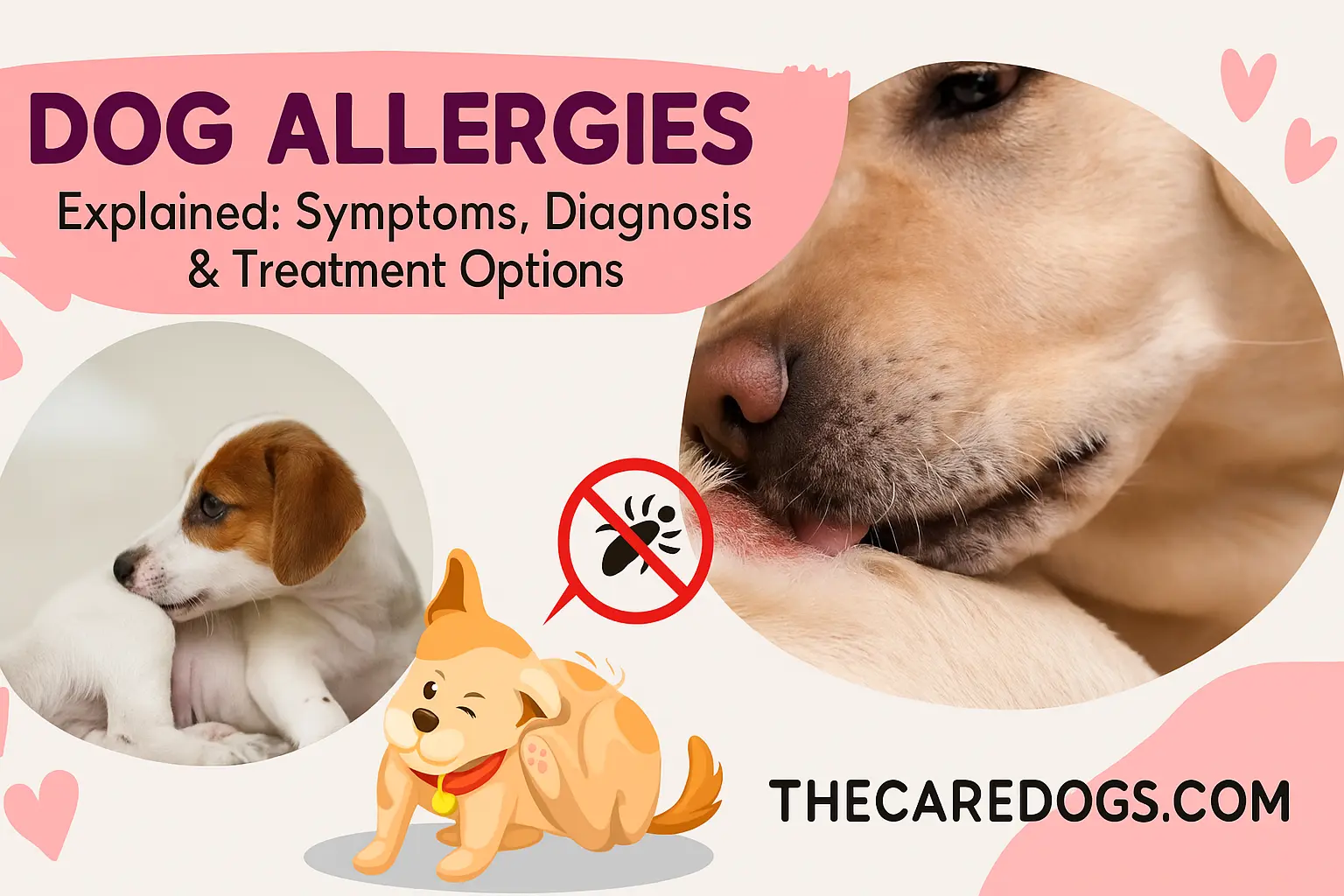Dog Allergies Explained: Symptoms, Diagnosis & Treatment Options
Dog Allergies Similar to humans, dogs are also prone to allergies that lead to pain, irritation, and even long-term complications if they are not treated. Allergies in dogs occur when their immune system in the body overreacts to harmless compounds like pollen, dust, or food. Having information on symptoms, causes, and treatments can help improve your dog’s quality of life considerably.
What Causes Allergies in Dogs?
Dog Allergies Canine allergies are brought about by an excessive immune response. Even though the causes can be different in each instance, a majority of instances fall into one of three groups.
Environmental Allergies (Pollen, Dust, Mold)
Seasonal allergies affect dogs most commonly. Trees, grasses, and weeds release pollen that affects their skin or respiratory tract. Dust mites and mold spores also induce year-round allergies that make dogs itch or sneeze indoors.
Food Allergies and Sensitivities
Some dogs become allergic to proteins such as beef, chicken, or milk. As compared to intolerance’s, frank food allergies induce an immune reaction, which usually causes the skin to itch, leads to ear infections, or results in Castro-intestinal issues such as diarrhoea and vomiting.
Flea Allergy Dermatitis
One bite from a flea creates the most intense itchiness in flea saliva-allergic dogs. It can create hot spots, hair loss, and skin infections if left untreated.
Symptoms of Canine Common Allergy
Dog Allergies Early diagnosis ensures your pet receives proper treatment.
Skin and Coat Reaction
- Persistent itching and scratching
- Red, inflamed patch of skin
- Balding or areas of hair loss
- Chronic ear infections
Respiratory Problems
- Sneezing and coughing
- Runny nose or runny eyes
- Wheezing or shortness of breath (rare but a possibility)
Gastrointestinal Issues
- Vomiting
- Diarrhea
- Chronic gas or bloating
How Vets Diagnose Canine Allergies
Dog Allergies It is not simple to diagnose allergies in dogs since the symptoms tend to resemble other illnesses.
Physical Examination
The vet will start by checking your dog’s skin, coat, ears, Dog Allergies and overall health for external signs of allergic reactions.
Allergy Testing Methods
Skin and blood tests are taken to determine particular allergens. Dog Allergies They are not 100% correct but can be useful in determining treatment.
Elimination Diet Trials
For alimentary allergies, veterinarians recommend placing the dog on a hypoallergenic or novel protein diet for 8–12 weeks, adding foods gradually to determine the offender.
Treatment for Dog Allergies
Lucky for us, there are numerous treatment options which enable dogs to live a normal life despite allergies.
Medication and Antihistamines
Antihistamines from the pharmacy or other over-the-counter antihistamines or medication from the veterinarian can minimize itching and swelling. Dog Allergies Severe cases may be suggested by a veterinarian with corticosteroids or more recent medications such as Apoquel and Cytopoint.
Immunotherapy (Allergy Shots or Drops)
For long-term relief, immunotherapy is prescribed by vets, which slowly desensitizes a dog to an allergen.
Prescription Diets and Nutritional Support
Food. Food allergy sufferers often thrive on hydrolyzed protein or limited ingredient diets. Omega-3 supplements also help reduce inflammation.
Flea Control and Preventive Care
Daily flea prevention is advisable, especially for dogs with as flea allergy dermatitis. Topical agents systemic drugs and flea proofing your the home can forestall flare ups.
Home Remedies and Lifestyle Changes
Medical care is necessary but lifestyle changes can improve your dogs comfort level as well.
Bathing and Grooming Tips
Daily bathing using hypoallergenic shampoos eliminates to the allergens from the coats and skin of your dogs efficiently. Regular grooming also wards off dust, pollen, and dander buildup.
Hypoallergenic Diet Plans
Maintaining a consistent diet, good quality minimizes digestive stress. Table foods must not be fed; only vet-commended food can be used.
Environmental Control Measures
Indoor allergens can be reduced by frequent vacuum cleaning, air purifiers, and washing of beddings. Keeping your dog indoors when there is pollen may also be helpful.
Prevention of Allergic Reactions in Dogs
You cannot always prevent allergies, Dog Allergies but preventative care lowers the frequency of outbreak. Proper diets, regular flea control, and frequent visits to the vet are all preventative.
When to See a Veterinarian
Dog Allergies If your dog continues to get recurring itching, ear infections, or gastrointestinal issues, take them to the vet. Unaddressed allergies can evolve into chronic skin infections and reduce your dog’s comfort level.
Frequently Asked Questions (FAQs)
Q1: What is the difference between food allergy and food intolerance in dogs?
Food allergy stimulates the immune system, whereas intolerances are a matter of digestive issues, not involving the immune system.
Q2: Do dogs outgrow allergies?
All allergies are permanent, but some symptoms can be well-controlled.
Q3: Are dog allergies life-threatening or hazardous?
Although most allergies are unpleasant, anaphylaxis is a rare occurrence but does exist.
Q4: How quickly can allergy therapies be counted upon to be effective?
Some medication works within a few hours but can take several months for immunotherapy to take effect.
Q5: What is the ideal diet for an allergic dog?
An elimination or hydrolysed protein approach ideally with veterinary guidance is usually ideal.
Q6: Can dog allergies ever be cured completely?
No, there is no cure for good, but treatment and diet modification can be extremely effective in controlling symptoms.
Conclusion
Dog allergies are treatable and common with proper management. Identifying the causes, detecting the symptoms in due course, and consulting a vet can make your pet itch-free and happier. With environmental changes, medications, or dietary modifications, regular care makes it all worthwhile.







